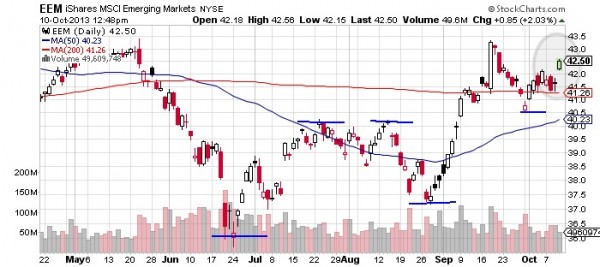It’s a fact: Janet Yellen will take charge of the Federal Reserve in the New Year and unless something drastic happens, the Federal central bank is likely to maintain its flow of easy money into the economy—albeit, perhaps at a slower pace than that dictated by current chairman Ben Bernanke.
The reception of Yellen was evident in the emerging markets, as shown by the chart of the iShares MSCI Emerging Markets below and the shaded oval.
With Yellen at the helm, I expect the continued flow of liquidity will benefit the emerging markets. This is because the easy money will keep U.S. bond yields lower, and investors, armed with the cheap market, will search for higher yields and high potential investments that, at this time, are generally found in the emerging markets. This is why the emerging markets got a boost when Yellen was appointed.
Chart courtesy of www.StockCharts.com
Now, while there were many who ditched the emerging markets, I was not one of them, as I continue to feel the key to economic growth in the global economy will be tied to the rise in consumer spending in the emerging markets. Simply put, the emerging markets will continue to be an excellent place to have some capital invested, whether it’s the BRIC countries (Brazil, Russia, India, and China) or the four “Little Tigers” in Southeast Asia (Hong Kong, Singapore, South Korea, and Taiwan). I’m bullish on these areas of the world. When you look at the wealth creation in these emerging pockets, you’d understand why I am.
Just take a look at the major acceleration in consumer spending in China. Growth in consumer spending there is somewhere in the neighborhood of 13%, which is staggering. In my view, you cannot ignore China. And while India is also worth a lot, it’s still a ways away from being as economically influential as its neighbor China. Just the combined populations of over two billion people in these two countries should be attractive for retailers due to the potential for a wide consumer base and strong consumer spending.
Bain & Company sums it up perfectly: “China, followed by India and other emerging Asian economies, is creating a vast new population of consumers, whose growth will continue into the coming decade.” (Source: “The Great Eight: Trillion-Dollar Growth Trends to 2020,” Bain & Company web site, last accessed October 11, 2013.) Bain suggests about two-thirds of the world’s growth in the middle class will be generated from China and India, which will mean a massive boom to global consumer spending.
Growth in Latin America is estimated to come in at 3.5% this year, according to the International Monetary Fund.
One of the top regions in Latin America is Brazil, as the country gets set to host the World Cup in 2014, followed by the Olympics in 2016. The Brazilian benchmark index (Bovespa) is up 19% from its 52-week low and is still well below its 52-week high of 63,473.
In Asia, I continue to favor massive consumer spending and growth in South Korea, which is home to several world-class companies, such as Samsung Electronics Co. Ltd., LG Corporation, and The Hyundai Motor Company.
Another area of high consumer spending that will drive economic growth is Eastern Europe, with Russia and Poland as the frontrunners for growth.
The bottom line is: don’t limit yourself to investments in the American economy; you need to consider exploring the opportunities arising in the emerging markets, where the gains could be explosive. An emerging market exchange-traded fund (ETF) worth a look is the iShares MSCI Emerging Markets EEM. If you want more leverage, take a look at the Direxion Daily Emerging Markets Bull 3x ETF EDC.
This article Talk of Easy Money Is Reviving Emerging Market Investments was originally published at Investment Contrarians
© 2025 Benzinga.com. Benzinga does not provide investment advice. All rights reserved.
Trade confidently with insights and alerts from analyst ratings, free reports and breaking news that affects the stocks you care about.
